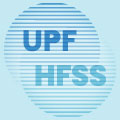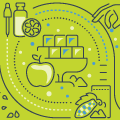A new study that models the combined effects of a sugar-based tax on beverages and targeted subsidies for minimally processed foods and drinks found that under these policies, low-income consumers would purchase less sugar-sweetened beverages and more fruits, vegetables, and healthier drinks, particularly in households without children. Researchers from the Global Food Research Program […]
New study charts policy path to identifying ultra-processed foods and beverages high in nutrients of concern

A new study from researchers at the Global Food Research Program at UNC-Chapel Hill and The George Institute for Global Health provides guidance for policymakers on how to identify ultra-processed foods and beverages that are also high in salt, sugar, saturated fat, or calorie-dense for regulation. To date, food policies aimed at improving population nutrition […]
Over half of foods and beverages purchased by Americans contain technical food additives — a 10% increase since 2001

A new study in the Journal of the Academy of Nutrition and Dietetics has found that 60% of foods purchased by Americans contain technical food additives such as coloring or flavoring agents, preservatives, or sweeteners. This represents a 10% increase since 2001. Manufacturers have also increased the average number of additives in purchased food and […]
Popkin urges FDA to adopt front-of-package warning labels

On Thursday, Sept. 29, Dr. Barry Popkin testified at a special U.S. Food and Drug Administration (FDA) public meeting in support of policies to improve the American diet and diet-related diseases. He joined six other consumer, research, government, and industry representatives who were invited to comment before an Independent Expert Panel as part of an […]
Healthy Helping program made fruits and vegetables affordable for North Carolinians during the COVID-19 pandemic

Low-income North Carolinians who received a monthly fruit and vegetable benefit during the COVID-19 pandemic enjoyed the flexibility to choose more and a greater variety of nutritious foods during a time of profound food insecurity, according to a new study in the Journal of Hunger & Environmental Nutrition. Researchers from UNC-Chapel Hill interviewed participants in […]
Americans consume red meat from a variety of foods, creating opportunities to introduce meat-free substitutions

The typical American diet is high in red and processed meat, contributing to health risks and raising concerns for environmental sustainability. A study published this week in Public Health Nutrition used data from national diet surveys to look at which specific types of foods make up the bulk of U.S. red and processed meat intake […]
Ng and colleagues awarded grant to explore cost savings from produce prescription programs

The Duke Endowment has awarded a $765,000 grant to Dr. Shu Wen Ng and colleagues Dr. Thomas Keyserling (UNC School of Medicine), Dr. Ashley Price (Duke University Department of Family Medicine and Community Health), and Neal Curran and Sam Hoeffler (Reinvestment Partners) to expand their research on the benefits of the food prescription programs. Administered […]
Healthier WIC food package leads to change in food-buying habits
A new study, led by Shu Wen Ng, published online in the American Journal of Preventive Medicine, found that changes in the food choices and nutritional content of WIC packages has produced improvements in overall food purchase habits among program participants. The USDA made changes to the WIC (Special Supplemental Nutrition Program for Women, Infants and Children) […]
Consumer Reports asks Can ‘Sin Taxes’ Solve America’s Obesity Problem?
A recent article from Consumer Reports, titled “Can ‘Sin Taxes’ Solve America’s Obesity Problem?” reviews recent policy levying taxes on sugar-sweetened beverages and junk food, the impact of such taxes in municipalities within America and countries around the world, and quotes Dr. Barry Popkin on the research surrounding these taxes and their effects on intake. While a […]
Study by Jen Poti finds differences in household purchases of highly processed foods
A newly published study by Dr. Jen Poti found that African-American and Hispanic households purchased less of highly processed foods when compared to White households. Dr. Poti discussed the findings in a press release from the UNC Gillings School of Global Public Health: “Our findings indicate that purchases of highly processed foods were lower among […]
Guardian: Americans cutting calorie intake but junk food proves a hard habit to kick
A new article in The Guardian, titled Americans cutting calorie intake but junk food proves a hard habit to kick, features UNCFRP research from a January article in the American Journal of Clinical Nutrition and commentary by Dr. Barry Popkin. The downturn in calorie intake is not so much a watershed in the fight against obesity […]
Taxes may discourage purchase of sugared & high-fat beverages in US households with young children
A new study by Christopher N. Ford, PhD, found that a tax on beverages high in sugar and/or fat may be associated with favorable shifts in food and beverage purchases among households in the United States with a preschool child. A press release by the Gillings School of Global Public Health featured Ford’s research: Researchers […]
Poti: Processed Foods Account for >75% of Calories Purchased from US Grocery Stores
A study by Jennifer Poti found that >75% of the foods Americans purchased from grocery stores is moderately or highly processed, as reported by TIME on May 21, 2015. As much as Americans like to pretend to worship at the altar of kale, many of us are cheating with chips, a new study suggests. We like junk […]
Study: preschoolers’ calorie intake down in last decade
A new study by Christopher Ford, doctoral candidate in nutrition epidemiology at UNC Gillings School of Global Public Health and research assistant with the UNCFRP evaluated beverage trends of U.S. preschool children over a 10 year period between 2003-2012. The study noted that among U.S. preschoolers, total caloric intake fell by 132 calories per day, with […]
Study: Consumer Purchases of Cakes, Cookies and Pies Have Decreased by 24 Percent
A new study published by the Journal of the Academy of Nutrition and Dietetics, by recent UNC graduate (and UNCFRP alum) Dr. Kevin C. Mathias, finds that consumer purchases of cakes, cookies, pies, and other ready-to-eat grain-based desserts decreased by 24% from 2005-2010. Dr. Mathias investigated this group of foods (ready-to-eat grain-based desserts) because they […]
Study: Daily tasks can get sedentary workers closer to national physical activity guidelines
A new study published in the journal Social Science & Medicine, titled No time for the gym? Housework and other non-labor market time use patterns are associated with meeting physical activity recommendations among adults in full-time, sedentary jobs, with lead author Lindsey Smith, found that people with sedentary (or deskbound) jobs can still meet national […]
UNC Study Shows Food and Beverage Companies Exceed Caloric Cut Pledge
Release from UNC Gillings School of Public Health – September 17, 2014 (CHAPEL HILL, N.C.) 16 of the world’s largest food and beverage producing companies pledged to help reduce obesity of American families with children two to 18 years old by pledging to eliminate 1 trillion calories from the products these companies sold in the […]
Families with Preschoolers Bought Fewer High Calorie Beverages, Chris Ford’s Study shows
A new report in the American Journal of Preventive Medicine, titled Are Food and Beverage Purchases in Households with Preschoolers Changing? A Longitudinal Analysis from 2000 to 2011, with lead author Chris Ford, shows that between 2000-2011 purchases of high calorie foods and beverages declined in households with preschoolers. This study was featured by the Gillings School of […]
Children’s Reported Energy Intake Falls; Later, Increases for Some
Recent research by UNCFRP team members and UNC Gillings School of Global Public Health researchers finds evidence of a decline in U.S. children’s reported energy intake in the early 2000s that is consistent with the previously identified obesity plateau that occurred in children in the early 2000s. It’s not all good news, though: the team […]
Barry Popkin quoted in “Obesity Rate for Young Children Plummets 43% in a Decade”
A recent article in the New York Times highlighted research findings from a CDC report published in the Journal of the American Medical Association that showed a significant decrease in obesity rates among young children (ages 2 – 5) from 13.9% to 8.4% between 2003-04 and 2011-12. This drop in obesity rates is a good sign. Barry Popkin […]